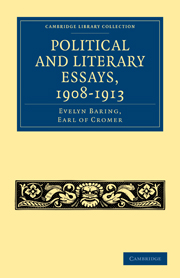Book contents
- Frontmatter
- PREFACE
- Contents
- “THE EDINBURGH REVIEW”
- “THE QUARTERLY REVIEW”
- “THE NINETEENTH CENTURY AND AFTER”
- “THE SPECTATOR”
- VIII DISRAELI
- IX RUSSIAN ROMANCE
- X THE WRITING OF HISTORY
- XI THE GREEK ANTHOLOGY
- XII LORD MILNER AND PARTY
- XIII THE FRENCH IN ALGERIA
- XIV THE OTTOMAN EMPIRE
- XV WELLINGTONIANA
- XVI BURMA
- XVII A PSEUDO-HERO OF THE REVOLUTION
- XVIII THE FUTURE OF THE CLASSICS
- XIX AN INDIAN IDEALIST
- XX THE FISCAL QUESTION IN INDIA
- XXI ROME AND MUNICIPAL GOVERNMENT
- XXII A ROYAL PHILOSOPHER
- XXIII ANCIENT ART AND RITUAL
- XXIV PORTUGUESE SLAVERY
- XXV ENGLAND AND ISLAM
- XXVI SOME INDIAN PROBLEMS
- XXVII THE NAPOLEON OF TAINE
- XXVIII SONGS, PATRIOTIC AND NATIONAL
- XXIX SONGS, NAVAL AND MILITARY
- INDEX
- Frontmatter
- PREFACE
- Contents
- “THE EDINBURGH REVIEW”
- “THE QUARTERLY REVIEW”
- “THE NINETEENTH CENTURY AND AFTER”
- “THE SPECTATOR”
- VIII DISRAELI
- IX RUSSIAN ROMANCE
- X THE WRITING OF HISTORY
- XI THE GREEK ANTHOLOGY
- XII LORD MILNER AND PARTY
- XIII THE FRENCH IN ALGERIA
- XIV THE OTTOMAN EMPIRE
- XV WELLINGTONIANA
- XVI BURMA
- XVII A PSEUDO-HERO OF THE REVOLUTION
- XVIII THE FUTURE OF THE CLASSICS
- XIX AN INDIAN IDEALIST
- XX THE FISCAL QUESTION IN INDIA
- XXI ROME AND MUNICIPAL GOVERNMENT
- XXII A ROYAL PHILOSOPHER
- XXIII ANCIENT ART AND RITUAL
- XXIV PORTUGUESE SLAVERY
- XXV ENGLAND AND ISLAM
- XXVI SOME INDIAN PROBLEMS
- XXVII THE NAPOLEON OF TAINE
- XXVIII SONGS, PATRIOTIC AND NATIONAL
- XXIX SONGS, NAVAL AND MILITARY
- INDEX
Summary
“The Spectator,” June 28, 1913
The early history of the British connection with Burma presents all the features uniformly to be found in the growth of British Imperialism. These are, first, reluctance to move, coupled with fear of the results of expansion, ending finally with a cession to the irresistible tendency to expand; secondly, vagueness of purpose as to what should be done with a new and somewhat unwelcome acquisition; thirdly, a tardy recognition of its value, with the result that what was first an inclination to make the best of a bad job only gradually transforms itself into a feeling of satisfaction and congratulation that, after all, the unconscious founders of the British Empire, here as elsewhere, blundered more or less unawares into the adoption of a sound and far-seeing Imperial policy.
In 1825, Lord Amherst, in one of those “fits of absence” which the dictum of Sir John Seeley has rendered famous, took possession of some of the maritime provinces of Burma, and in doing so lost three thousand one hundred and fifteen men, of whom only a hundred and fifty were killed in action. Then the customary fit of doubt and despondency supervened. It was not until four years after the conclusion of peace that a British Resident was sent to the Court of Ava in the vain hope that he would be able to negotiate the retrocession of the province of Tenasserim, as “the Directors of the East India Company looked upon this territory as of no value to them.”
- Type
- Chapter
- Information
- Political and Literary Essays, 1908–1913 , pp. 287 - 297Publisher: Cambridge University PressPrint publication year: 2010First published in: 1913

